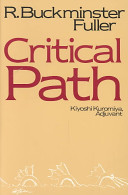Buckminster Fuller on the Concept of God
My definition of the word believe means to accept an explanation of phys¬ ical phenomena without any experiential evidence. At the outset of my re¬ solve not only to do my own thinking but to keep that thinking concerned only with directly experienced evidence, I resolved to abandon completely all that I ever had been taught to beheve. Experience had demonstrated to me that most people had an authority-trusting sense that persuaded them to believingly accept the dogma and legends of one religious group or another and to join that group's formaUzed worship of God.
I asked myself whether I had any direct experiences in life that made me have to assume a greater intellect than that of humans to be operative in Universe. I immediately referred back to my good education in the sciences and my directly experienced learning of the operation of a plurality of physical laws—such as the interattraction of celestial bodies, varying inversely as the second power of the arithmetical distances intervening—which laws could only be expressed in the purely intellectual terms of mathematics, which plurality of laws always and only related to eternal relationships existing between and not in any one of the interrelated phenomena when considered only separately. None of the eternal and always concurrently operative laws had ever been found to contradict one another—ergo, they were all designedly interaccommodative like a train of gears. Many also were interaugmentative. I said that when we use the word design in contradistinction to randomness, we immediately infer an intellect that sorts out a complex of potentials and interarranges components in complementary ways—ergo, human mind in discovering a plurality of these only mathematically expressible eternal laws, all of which are interaccommodative, is also discovering the intellectually designed scenario Universe, whose designing requires the a priori eternal existence of an intellectual integrity of eternally self-regenerative Universe. I said to myself, I am o'erwhelmed by the only experientially discovered evidence of an a priori eternal, omnicomprehensive, infinitely and exquisitely concerned, intellectual integrity that we may call God, though knowing that in whatever way we humans refer to this integrity, it will always be an inadequate expression of its cosmic omniscience and omnipotence.
Notes:
He believes the word fails to capture the awesomeness of the universe.
Folksonomies: science religion atheism empiricism theology
Taxonomies:
/hobbies and interests/games/board games and puzzles (0.577235)
/religion and spirituality (0.463376)
/hobbies and interests/paranormal phenomena (0.257667)
Keywords:
priori eternal existence (0.976321 (neutral:0.000000)), phys¬ ical phenomena (0.958286 (neutral:0.000000)), expressible eternal laws (0.927851 (neutral:0.000000)), directly experienced evidence (0.919156 (neutral:0.000000)), concurrently operative laws (0.915168 (negative:-0.475918)), experientially discovered evidence (0.906300 (neutral:0.000000)), intellectual integrity (0.893665 (neutral:0.000000)), purely intellectual terms (0.891788 (neutral:0.000000)), intellectually designed scenario (0.881386 (positive:0.435849)), eternally self-regenerative Universe (0.866402 (neutral:0.000000)), eternal relationships (0.746181 (negative:-0.379710)), Buckminster Fuller (0.739575 (negative:-0.766471)), greater intellect (0.707736 (neutral:0.000000)), experiential evidence (0.704928 (neutral:0.000000)), arithmetical distances (0.696509 (neutral:0.000000)), interrelated phenomena (0.686344 (negative:-0.379710)), authority-trusting sense (0.680962 (neutral:0.000000)), direct experiences (0.679051 (neutral:0.000000)), cosmic omniscience (0.677359 (neutral:0.000000)), good education (0.674039 (neutral:0.000000)), religious group (0.673753 (neutral:0.000000)), physical laws—such (0.672804 (neutral:0.000000)), celestial bodies (0.671951 (neutral:0.000000)), inadequate expression (0.668231 (neutral:0.000000)), interarranges components (0.655681 (positive:0.465561)), human mind (0.655259 (neutral:0.000000)), complementary ways—ergo (0.654234 (positive:0.465561)), word design (0.647176 (neutral:0.000000)), plurality (0.633497 (negative:-0.379710)), God (0.563873 (negative:-0.766471))
Entities:
Buckminster Fuller:Person (0.765854 (negative:-0.766471))
Concepts:
God (0.958260): dbpedia | freebase | opencyc
Universe (0.576946): dbpedia | freebase
Religion (0.516084): dbpedia | freebase | opencyc
Learning (0.514439): dbpedia | freebase | opencyc
Buckminster Fuller (0.474856): dbpedia | freebase | opencyc | yago
Time (0.461092): dbpedia | freebase | opencyc
Early Islamic philosophy (0.452898): dbpedia | freebase
Cognition (0.450121): dbpedia | freebase | opencyc





